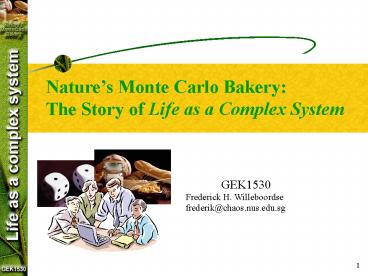GEK1530 - PowerPoint PPT Presentation
1 / 26
Title:
GEK1530
Description:
This lecture aims to give an overview of the course and ... Building Blocks in Paleontology. Examples. 24. GEK1530. The venous and arterial system of a kidney ... – PowerPoint PPT presentation
Number of Views:74
Avg rating:3.0/5.0
Title: GEK1530
1
Natures Monte Carlo BakeryThe Story of Life as
a Complex System
- GEK1530
Frederick H. Willeboordse frederik_at_chaos.nus.edu.s
g
2
Briefing and Introduction
- Lecture 0
This lecture aims to give an overview of the
course and provide some background as with
regards to its general philosophy.
3
Who am I?
- Frederick H. Willeboordse
- S12 03-06
- Dept. of Physics
- Specialized in Complex Systems
- Also ran a business for 5
- years
This picture was taken in 2371 on board of the
starship Enterprise and is, due to time
distortions, a bit blurry. Who would have thought
Id end up in Singapore!
4
The Complexity of Life
Is Life a Complex System?
I think so!
Obviously, life is complex in the daily sense but
here well be talking about life as a complex
system in the scientific sense.
5
Why the module?
A different view!
In order to gain an understanding of nature in a
way thats rather different from the traditional
biology/chemistry centered approach.
How about Math?
The amount of Mathematics will be very limited
and not exceed Secondary School level.
6
Workload
The total workload for this GEM is 10 hours per
week (on average).
A 2 lecture hours per week B 1 tutorial hour
per week C 0 lab work per week D 3 hours for
assignments per week E 4 hours of preparation
work per week
Of course, for this module, items DE can overlap.
7
Course Schedule
- Lectures 2 to 4 hours per week for a total of
26 lecture hours (these include the in-class
quizzes) - TutorialsSmall-group and In-class tutorials
- Discussion SessionsPart of Small-group tutorials
8
Assessment
All together there will be 10 quizzes with which
you can earn 5 points each for a total of 50
points.The final exam will be open book and
count for 50 points as well.
Quizzes 10 5 points Exam 1 50 points
9
Lectures
During most of the lectures, there will be a
quiz. Usually, Ill try to do the quiz around the
middle of the lecture so that you wont miss it
if you come late.
Discussion of Assignment
Discussion of Previous Quiz
First Part of the Lecture
Lecture
Quiz
Second Part of the Lecture
Applets and Animations
10
Tutorials Discussion Sessions
The goal of the tutorial is to have a free and
open discussion.
There are two types of tutorials In-class
tutorials and Small-group tutorials.
The Small-group tutorials are mainly for
discussions
The In-class tutorials are mainly for QA
Ask!
Talk!
11
Tutorial Registration
http//chaos.nus.edu.sg/cgi-bin/GEK1530/register.p
l
12
Tutorial Registration
You can see for which groups you friends signed
up and the practical allocation once it's
completed at this URL http//chaos.nus.edu.sg/cg
i-bin/GEK1530/display.pl
Allocation is done by ballot as announced on the
course web site.
13
Text Books
All the lecture notes as well as other relevant
material can be found on my web site
athttp//chaos.nus.edu.sg/teaching/GEK1530
Some good but optional text books are
F. Dyson Origins of Life
M. Eigen R. Winkler Laws of the Game
J. Maynard Smith E. Szathmary The Origins of
Life
14
Course Contents
There are basically five interwoven aspects,
illustrated with the metaphor of a bakery.
- Building Blocks and Recipes in Physics -General
aspects of complex systems - Building Block and Recipes in Chemistry
- Building Blocks and Recipes in Biology
- Building Blocks and Recipes in Evolution
- Life as a complex system
Does self-organization need intelligence?
15
Course Contents
- Building Blocks and Recipes in Physics -General
aspects of complex systems
Chaos Fractals Cellular Automata Turing Machine
16
Course Contents
II. Building Blocks and Recipes in Chemistry
PhospholipidsTuring PatternsDNA
17
Course Contents
III. Building Blocks and Recipes in Biology
DNA as a 'hard disk'The social amoebae
Dictyostelium Cell-differentiation
18
Course Contents
IV. Building Blocks and Recipes in Evolution
The origin of lifeMulti-cellular life -
replicate and modify!Population Dynamics
19
Course Contents
V. Life as a complex system
The search for UniversalitiesTop-down versus the
bottom-up approachRobustness of life
20
Key Concepts
Recipes
Laws, rules
Chance
Building Blocks
Permeates the living non-living world Think of
Quantum Mechanics, the comet that killed the
dinosaurs
Atoms, Molecules Nucleotides, Amino Acids
Life
Replication of Basic Units
Distinction between Hardware and Software
Manfred Eigen
Nucleotide monomers can give rise to nucleic acid
polymers that replicate and mutate (without
providing an RNA template but needs enzyme).
John v. Neumann
replication and metabolism are logically separable
Leslie Orgel
analogy between automata and living organisms
Nucleotide monomers can polymerize into RNA
(without the help of an enzyme but needs
template).
21
The Monte Carlo Bakery
Building BlocksRecipes/Laws ChanceStretch
Fold Complexity
22
Examples
Broccoli Romanesco
Illustrates Building Blocks, Fractals
Broccoli Romanesco is a cross between Broccoli
and Cauliflower.
23
Examples
Built from similar modified segments?
Building Blocks in Paleontology
24
Examples
Fractal Pathways Inside Us
Illustrates Fractal
Illustrates Building Blocks
Proteins
Deoxyribonucleic Acid
The venous and arterial system of a kidney
25
Key Points of the Day
Chance
Life!
Laws
Building Blocks
Complexity is fun!
26
Course Contents
IV. Self-organization in Evolution
The origin of lifeMulti-cellular life -
replicate and modify!Population Dynamics































